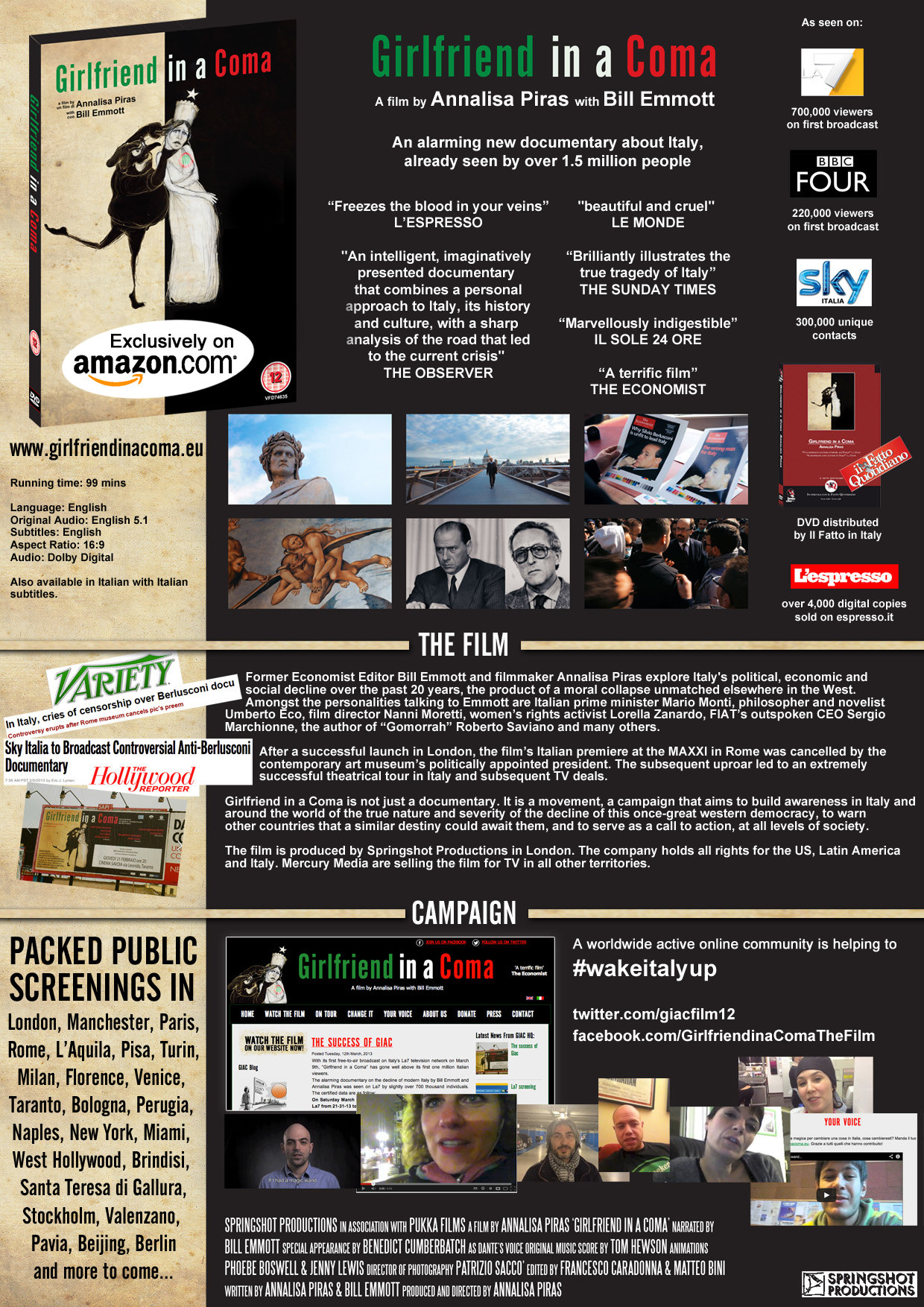
WTI Magazine # 1 2013 Oct,18
Author : Bill Emmott Translation by:
That has been the question most frequently asked of me since I, in an Anglo-Italian partnership with the film director Annalisa Piras, first released our documentary film about Italy, Girlfriend in a Coma, in February of this year. I expect it will be asked quite often during my tour of American screenings which begin in Brooklyn at the Union Center for Documentary Arts, on October 13th.
The answer, unfortunately, is clear: You bet she is, in the sense that Italy remains in deep trouble, riven by disputes, paralysed over the issue of how to reform the economy and the political system, with daily news still dominated by selfish, self-serving issues such as whether or not former prime minister Silvio Berlusconi should be expelled from the Senate now that he has joined Al Capone in becoming a convicted criminal for tax fraud. Meanwhile, having achieved by far the lowest annual average growth in GDP per head of all the rich industrial countries over the past 15 years, Italy remains stuck in recession.
But actually, on second thoughts, perhaps a better answer is this. Events during February's general election, as well as the response that Annalisa and I have received while showing GIAC at more than 50 screenings-plus-debates in independent venues all around Italy, and many elsewhere in Europe too, have suggested that the "girlfriend" is sitting up in her hospital bed, waving her arms about and shouting for change. The trouble is that the doctors and nurses—ie, the politicians and much of the media establishment—are not listening. As in the Berlusconi case, but also on the left in the Democratic Party, they are too pre-occupied by their own interests to worry much about the nation.
For clearly, Italians want change. We could tell that from the enormous response we received to the film—an often emotional, but very heartfelt and engaged response, from young and old alike. Clearly, we'd like more Italians to see the film than the two million who have done so already, on television and in public screenings, but the response from those who have has been quite overwhelming.
Quite a few, indeed, young and old, responded by joining or even setting up their own civil society groups to debate and hopefully bring about change. We wanted the film to be something of a wake-up call, and one of those new groups, set up by an inspiring pair of graduating students in Padua, is even called "Wake Up Italia".
Italy has so much energy, so much potential, that I cannot remain pessimistic for long, frustrating though the slowness of progress often is. That potential is one big reason why I, an Englishman, first got interested and involved, though a battle through the pages of The Economist and in the Italian libel courts (we won) with Silvio Berlusconi also played a part. Also, however, I, along with my colleague Annalisa, came to see Italy not as the exception that it is often portrayed as, but as a warning.
What kind of warning? A warning of what is happening, and could happen, in many of our western countries when special interest groups become too powerful; when businessmen cross the line between capitalism and government and start to try to set their own rules; when we let the rule of law wither away or become discredited; when we fail to build and maintain support for the kind of entrepreneurial but long-sighted capitalism that made the West great; when we let corruption and organised crime spread like a cancer; or, above all, when we as individuals lose the sense of responsibility and moral courage necessary to defend our democracies and the basic pillars of our free societies.
So I really want Americans, and Italians living in America, to watch Girlfriend in a Coma and see it not as a film just about Italy, but rather as a commentary on the dangers of western decline. And, in its use of Dante Alighieri, of course, as a call to all of us to shed "ignavia" and to make things change.





